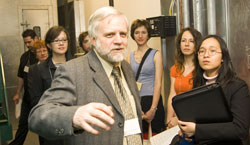Sustainable Concordia: making it easier to be green

Yves Gilbert of Facilities Management brings guests through what he calls “the belly of the beast”— the boiler room — in the Integrated Engineering and Visual Arts Complex during a tour as part of the Sustainable Business Conference on March 31.
Photo by john londono - iits creative media services
More than 100 people from around Montreal, Quebec, and Ontario learned how companies can reduce the impact they have on the environment during the second annual Sustainable Business Conference on March 31.
With final exams looming, many students were unable to attend, but “this year there was a higher concentration of corporate delegates, alumni, faculty and staff than last year,” said Debbie Carman, conference chair and a student in the John Molson School of Business.
“It means that we’re meeting our goal of reaching beyond Concordia to the general public, and that it is taking sustainability seriously.”
Sustainable Concordia hosted the event. From breakfast through to an early-evening wine and cheese, attendees were treated to a day of panel discussions, workshops and guest speakers in the DeSève Cinema.
Guy Dauncey, president of the BC Sustainable Energy Association, began the day with a concept that would become its theme: That sustainability should not be merely a far-off aspiration. Communities should be working harder to make it a reality.
He lauded a recent Ontario initiative of Advanced Renewable Tariffs (ART). Through this program, some producers of energy from sustainable sources, such as wind turbines, will be guaranteed access to the electrical grid and a fixed sale price for 20 years.
“It’s the single most significant energy policy change in North America since oil was discovered,” Dauncey said. “If we really want to accelerate our potential in sustainable energy, this is the way to do it. Quebec should adopt this.”
The highlight for many attendees was keynote speaker Peter Robinson, CEO of Mountain Equipment Co-op (MEC).
He described how sustainability is entrenched in all aspects of that company’s business, from its building in Marché Centrale that uses geothermal energy for heating and cooling, to its use of only organic cotton in its clothing.
MEC provides internal and third party audits of all the factories that make its products. In the future, Robinson said he hopes customers will one day be able to review information about the factory their particular knapsack, jacket or pair of hiking boots was made in.
“You’ll be able to judge whether the conditions the product was made in meet your standards.”
Participants also attended workshops, where they could learn how to make their own green roof, make restaurants more environmentally friendly, study the life cycle of various products or take a tour of the Integrated Engineering and Visual Arts Complex.
Yves Gilbert of Facilities Management, who was also on the design committee, led nearly 20 guests on the tour of the new building.
Among other things, they learned that it is 42 per cent more energy efficient than required by law, and that rooms are equipped with motion sensors that shut off lights and reduce ventilation when they are not in use.
“These are the kinds of things every building should have from now on,” said Joel Beatty, whose family-run business sells geothermal energy products near Toronto.
“It’s impressive, but it should be the standard. I’ll be happy when the day comes and I’m not impressed: When this is the norm.”
